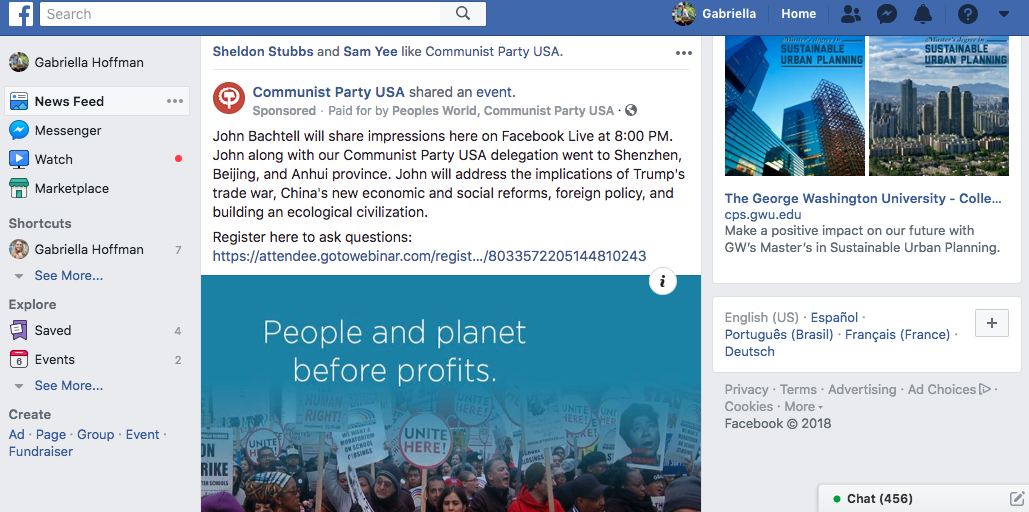
Facebook’s algorithm is suggesting me to like the Communist Party USA’s page? Neyt. #HideAd
Facebook can’t seem to escape controversy or faulty functions.
It loves to collect data on us, even when we aren’t using the app. The Cambridge Analytica scandal, perhaps, was the breaking point—though data collection firms from both political parties abuse voter data (Democrats included). Recently, the company lost $120 billion in market capitalization in a single day—the worst loss recorded of any company in existence. And it was just announced that Facebook wants to get in bed with U.S. banks. Who in their right mind suggested this? More from WSJ:
Facebook increasingly wants to be a platform where people buy and sell goods and services, besides connecting with friends. The company over the past year asked JPMorgan Chase JPM +0.02% & Co., Wells Fargo WFC +0.10% & Co., Citigroup Inc. C +0.03% and U.S. BancorpUSB +0.02% to discuss potential offerings it could host for bank customers on Facebook Messenger, said people familiar with the matter…Facebook has talked about a feature that would show its users their checking-account balances, the people said. It has also pitched fraud alerts, some of the people said.
In spite of these controversies, Facebook still remains the most widely-used platform out there—despite its sister company, Instagram, giving it a run for its money.
Understandably, Facebook is trying to cover for its mishaps and financial losses. Howeverm this doesn’t give them license to be sloppy when it comes to ad targeting. For instance, I saw this on my Newsfeed today:

Why the hell would I like this page or care for this event?
The problem lies in their faulty algorithm, which is very dynamic and complex. Most of the time relevant ads or pages are suggested to me, but this couldn’t be more off-target. Facebook says these changes will filter out the bad and prioritize interactions with family and friends. Why match me with the Communist Party USA? I post content that anti-communist, not affirming of communism. Facebook, what the heck?
In terms of targeted ads, Facebook users have the option to create ads that target specifically or target broadly:
Targeting specifically
Targeting specifically essentially means that you’re giving us a relatively strict set of parameters to work within while finding the best people to show your ad to. These parameters can take the form of demographic targeting or Custom or Lookalike Audiences. They may lead to a potential audience that’s smaller, but hopefully also to one that’s more interested in what you’re advertising than a larger and broader audience would’ve been.
…
Targeting broadly
Targeting broadly essentially means that you’re mostly relying on our delivery system to find the best people to show your ad to. This approach can lead to us finding potential customers you never would’ve known about otherwise. It’s also a good approach if you’re not sure who you want to target.
It seems like the CPUSA is employing the latter to target unsuspecting people—or their opponents. Yikes.
As a digital / social media strategist, I cannot help but shudder that this. Thankfully, I can hide the ad and mark it as irrelevant. What a relief!
For any early adopter of the most widely-used social media platform, we have witnessed an evolution of the platform, with its integrity being held in question. From a social network that tied users to their colleges to a robust platform to Live broadcast our every move, Facebook dominates our lives if allow it such.
Despite Facebook’s quirks, mishaps, and eccentricities, I will continue to be a user of the platform. I think good people should use it to counterbalance the bad.
Have you been targeted with ads like this? Let me know!
###
What did you think of this piece? Am I on-target or off-mark?
As always, I recommend you follow me on Facebook, Twitter, Instagram, and YouTube to stay in the loop with my musings. Subscribe to my newsletter–now LIVE. Chime in below with your comments!

Hi Gabriella,
I thought the Communist Party was banned from the USA? Am I wrong? I was told while growing up, that any type of Socialist and/or Communistic party was banned and was illegal in the USA. If it is allowed, now, when did that change take place? Curious.
It’s sadly allowed. Even hateful groups like them are unfortunately protected under the First Amendment.
Hi Gabriella,
So, I did a wee bit of research and found this:
The Communist Control Act (68 Stat. 775, 50 U.S.C. 841-844) is a piece of United States federal legislation, signed into law by President Dwight Eisenhower on 24 August 1954, which outlaws the Communist Party of the United States and criminalizes membership in, or support for the Party or “Communist-action” organizations and defines evidence to be considered by a jury in determining participation in the activities, planning, actions, objectives, or purposes of such organizations.
(cited: Peters, Gerhard; Woolley, John T. “Dwight D. Eisenhower: “Statement by the President Upon Signing the Communist Control Act of 1954.,” August 24, 1954″. The American Presidency Project. University of California – Santa Barbara. Retrieved 26 January 2014)
The Communist Control Act (68 Stat. 775, 50 U.S.C. 841-844) is a piece of United States federal legislation, signed into law by President Dwight Eisenhower on 24 August 1954, which outlaws the Communist Party of the United States and criminalizes membership in, or support for the Party or “Communist-action” organizations and defines evidence to be considered by a jury in determining participation in the activities, planning, actions, objectives, or purposes of such organizations.
(cited: Peters, Gerhard; Woolley, John T. “Dwight D. Eisenhower: “Statement by the President Upon Signing the Communist Control Act of 1954.,” August 24, 1954″. The American Presidency Project. University of California – Santa Barbara. Retrieved 26 January 2014)